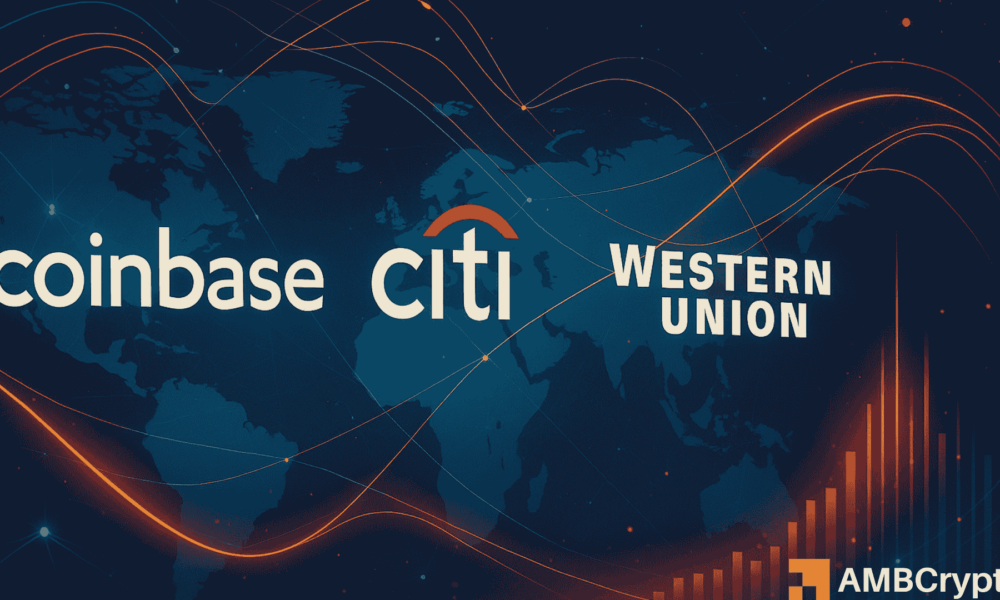The Evolution of Global Payments: Citigroup and Coinbase’s Strategic Partnership
In an era where traditional banking meets innovative technology, Citigroup has teamed up with Coinbase to revolutionize the global payments landscape. This strategic partnership, announced on October 27, signifies a pivotal shift towards integrating blockchain technology into mainstream financial systems. As Citigroup integrates Coinbase’s settlement rails, institutional clients are poised for faster and more efficient global payment solutions.
Moving Beyond SWIFT: A New Era of Settlement
The collaboration between Citigroup and Coinbase represents a significant departure from the conventional SWIFT-era correspondent banking model. By enabling corporate clients to route cross-border payments through Coinbase’s infrastructure, Citigroup is embracing a modernized approach to payment processing. This shift allows for expedited settlement and direct access to on-chain liquidity, steering away from traditional banking practices. The integration signals a transformative approach where settlements may increasingly rely on stablecoins, creating a streamlined experience for companies engaged in international commerce.
A Win-Win for Traditional Banks and Crypto Firms
This partnership illustrates how traditional banks are merging with crypto firms to reshape the core of the financial system. Citigroup emphasizes that its collaboration with Coinbase will facilitate blockchain-based settlement for multinational corporations without requiring direct exposure to cryptocurrencies. This pivot from viewing crypto as merely a speculative asset to perceiving it as a crucial settlement infrastructure showcases the growing acceptance of digital currencies in mainstream finance. The future may lean heavily towards automated, decentralized financial processes powered by stablecoins.
The Influence of Regulatory Developments
The launch of this partnership is timely, coinciding with the introduction of the GENIUS Act in the U.S., which establishes a legal framework for dollar-backed stablecoins. This regulatory structure sets the stage for banks to seamlessly integrate stablecoins into their payment systems, solidifying the legitimacy and stability of digital assets. Citigroup and Coinbase’s collaboration aligns perfectly with these developments, as both entities aim to pave the way for broader adoption of stablecoins in global transactions.
An Industry-Wide Shift: Western Union and Beyond
Citigroup isn’t alone in recognizing the potential of stablecoins for settlement. Western Union, a leader in cross-border remittances, confirmed during its earnings call that it is exploring stablecoin solutions to improve efficiency and reduce reliance on correspondent banking. The advantage of immediate settlement with dollar stablecoins is critical, especially given the multi-day clearing times typically associated with traditional banking. This collective shift signifies an industry-wide transformation, moving towards a new paradigm of efficient and instantaneous payments.
Crypto Firms Seeking Recognition
As Citigroup collaborates with Coinbase, other crypto-focused companies are actively seeking to enter the banking landscape. Crypto.com, for instance, has applied for a U.S. National Trust Bank Charter, aiming to operate as a regulated crypto custodian. This emerging trend highlights how exchanges and crypto firms are striving to reshape their roles within the financial system rather than existing solely as peripheral players. This evolving dynamic could potentially bolster consumer trust and enhance regulatory compliance in the digital asset sector.
A Future Built on Blockchain
The implications of Citigroup and Coinbase’s partnership are vast, signaling a gradual decoupling of settlement from traditional banking networks such as SWIFT. The new hybrid payment flows—transitioning from fiat to stablecoins and back—may well become the standard for international transactions. Not only does this collaboration deepen Coinbase’s institutional foothold, but for Citigroup, it acts as a crucial hedge towards embracing tokenized finance. As advancements in crypto regulations continue to unfold, all eyes will be on how quickly Citi’s clients adopt these new settlement methods and how other industry players, such as Western Union and Crypto.com, evolve alongside these changes.
In conclusion, the convergence of traditional banking and cryptocurrency signifies a pivotal moment in the evolution of global payments. As these sectors collaborate to enhance financial infrastructure, the emergence of blockchain technology and stablecoins could redefine how businesses approach cross-border transactions. The financial landscape is transforming, and with it, the possibilities for efficient, secure, and rapid global payments are expanding.


